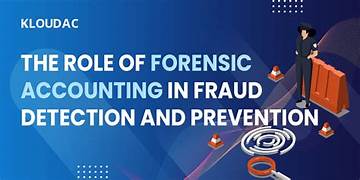The Role of Forensic Accounting in Unveiling Fraud
Fraud is a pervasive issue that affects individuals, businesses, and governments worldwide. It can take many forms—from embezzlement and financial statement manipulation to insider trading and money laundering. Regardless of the type, fraud undermines trust, depletes resources, and can have devastating consequences for its victims. In the fight against fraud, forensic accounting plays a critical role. By applying investigative skills, accounting knowledge, and auditing expertise, forensic accountants help uncover fraudulent activities and provide evidence that can be used in legal proceedings. This article delves into the role of forensic accounting in unveiling fraud, examining its processes, importance, and the techniques used to uncover fraudulent activities.
What is Forensic Accounting?
Forensic accounting is a specialized field of accounting that focuses on investigating financial crimes and fraud. It combines accounting, auditing, and investigative skills to examine financial records and transactions with the aim of uncovering discrepancies, fraudulent activities, or financial misconduct. Forensic accountants are trained to identify and follow the money trail, which can often lead to hidden assets, illicit transactions, and unlawful financial practices.
Unlike traditional accountants, who focus on ensuring accurate financial records for tax purposes or financial reporting, forensic accountants are experts in uncovering hidden financial information that may be used in legal or criminal proceedings. They work closely with law enforcement agencies, attorneys, and regulatory bodies to gather evidence, present findings, and testify in court when necessary.
The Importance of Forensic Accounting in Unveiling Fraud
Fraudulent activities often involve complex financial schemes that can be difficult to detect. In many cases, individuals or organizations involved in fraud go to great lengths to cover their tracks, making it challenging for traditional accounting methods to uncover illicit behavior. This is where forensic accounting comes into play. Forensic accountants are experts in spotting red flags and inconsistencies in financial records, even when the perpetrators have taken steps to hide their activities.
The role of forensic accounting in unveiling fraud is multifaceted and extends beyond identifying fraud. It also plays a significant role in:
- Preventing Future Fraud: Through their investigative work, forensic accountants identify weaknesses in a company’s financial controls and procedures. By understanding how fraud occurred, companies can take steps to implement better safeguards, such as stronger internal controls, employee training, and improved oversight.
- Providing Legal Evidence: When fraud is suspected, forensic accountants gather evidence that can be used in court. This evidence can include financial documents, transaction records, and witness testimony, all of which are crucial for building a case against perpetrators. Forensic accountants also help attorneys understand complex financial matters, making it easier to present fraud-related cases in a legal setting.
- Protecting the Reputation of Organizations: Fraud can severely damage an organization’s reputation, leading to a loss of customers, investors, and business opportunities. By uncovering fraudulent activities and taking swift action, forensic accountants can help organizations preserve their integrity and credibility.
- Recovering Stolen Assets: Forensic accountants assist in tracking down stolen assets and helping organizations recover funds or assets that were misappropriated. Through detailed financial analysis and investigation, forensic accountants can trace the movement of illicit funds and help recover assets from perpetrators.
The Forensic Accounting Process
The forensic accounting process is comprehensive and involves several key steps to uncover fraud. These steps require a combination of investigative skills, accounting expertise, and legal knowledge. Below is an overview of the forensic accounting process:
1. Initial Assessment and Engagement
When a potential fraud is suspected, the first step in forensic accounting is to conduct an initial assessment of the situation. This involves gathering information about the organization, understanding the nature of the suspected fraud, and determining the scope of the investigation. At this stage, the forensic accountant will also establish a plan for how the investigation will proceed, including timelines, resources, and objectives.
During the engagement phase, forensic accountants often meet with key stakeholders, such as senior management, auditors, or legal counsel, to discuss the situation and determine the best course of action. The forensic accountant’s role is to understand the nature of the fraud and the potential impact on the organization, its employees, and other stakeholders.
2. Data Collection and Analysis
Once the investigation is underway, the forensic accountant begins collecting relevant financial data and documents. This can include accounting records, bank statements, tax returns, invoices, contracts, and payroll records. Forensic accountants use their expertise to analyze this data for any signs of irregularities, discrepancies, or unusual transactions.
In many cases, forensic accountants need to delve deeper into the financial data to identify patterns of fraudulent activity. This may involve reviewing historical transactions, tracing money flows between accounts, and identifying any manipulations or anomalies in the records. The forensic accountant’s ability to analyze large volumes of data and identify hidden patterns is crucial in uncovering fraud.
3. Fraud Detection
During the data analysis phase, forensic accountants use various techniques to detect fraud. Some common techniques include:
- Benford’s Law: This is a statistical method used to detect anomalies in numerical data. By analyzing the frequency distribution of digits in financial data, forensic accountants can identify irregularities that may indicate fraudulent activity.
- Ratio Analysis: Forensic accountants compare financial ratios, such as profit margins, revenue growth, and expenses, to industry benchmarks and historical performance. Unusual deviations from standard ratios can indicate fraud or misreporting.
- Trend Analysis: By comparing current financial data with historical data, forensic accountants can identify abnormal trends or fluctuations that may indicate fraud. This can include sudden spikes in expenses, unexplained revenue changes, or inconsistencies in asset valuations.
- Document Examination: Forensic accountants also examine physical and digital documents to identify signs of forgery or tampering. This can involve scrutinizing signatures, dates, and invoice numbers to determine whether documents have been altered.
4. Interviews and Investigations
Forensic accountants often conduct interviews with employees, vendors, or other individuals who may have information relevant to the fraud investigation. These interviews help gather additional insights into the circumstances surrounding the fraud, and may also reveal witnesses who can provide critical testimony.
The interviews are typically conducted with the utmost care, as the goal is to obtain valuable information without making accusations or creating unnecessary tensions. Forensic accountants are trained to ask the right questions and recognize when someone may be evading the truth.
5. Reporting Findings
Once the forensic accountant has gathered sufficient evidence, they prepare a detailed report outlining their findings. The report includes a clear summary of the fraud, the methods used, and the financial impact on the organization. It also includes recommendations for improving financial controls and preventing future fraud.
The forensic accountant may also provide expert testimony in legal proceedings. In these cases, they present their findings to a court of law or arbitration panel and explain the methods used to uncover the fraud. Their role as an expert witness is to clarify complex financial matters for non-experts, such as judges and juries.
6. Recovery and Prevention
Following the conclusion of the investigation, forensic accountants may assist in recovering stolen assets or funds. This may involve working with law enforcement, banks, or other agencies to track down perpetrators and recover assets. Forensic accountants can also help organizations implement stronger internal controls and fraud prevention measures to reduce the likelihood of future incidents.
Challenges in Forensic Accounting
While forensic accounting is a powerful tool for uncovering fraud, it is not without its challenges. Some of the difficulties faced by forensic accountants include:
- Complexity of Fraud Schemes: Fraudsters are becoming increasingly sophisticated, often using advanced techniques to conceal their activities. This makes it difficult for forensic accountants to uncover fraud, especially when it involves complex financial instruments or international transactions.
- Data Overload: Forensic accountants must analyze vast amounts of data to uncover fraud. This can be time-consuming and requires specialized tools and software to manage and analyze large datasets efficiently.
- Legal and Ethical Considerations: Forensic accountants must navigate legal and ethical considerations when conducting investigations. They must adhere to strict confidentiality agreements, follow legal procedures, and ensure their findings are credible and admissible in court.
Conclusion
Forensic accounting plays a crucial role in uncovering and preventing fraud within organizations. By combining investigative techniques with accounting expertise, forensic accountants help detect financial discrepancies, gather evidence, and provide insights that can be used in legal proceedings. As fraud continues to evolve in complexity, the demand for forensic accounting services will only increase. Ultimately, forensic accountants help organizations maintain financial integrity, protect their assets, and safeguard their reputations by uncovering fraudulent activities before they cause lasting damage.


